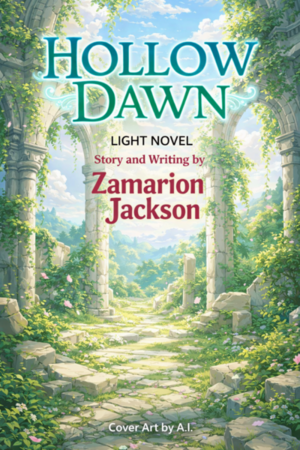Chapter 6:
Chapter 6: Beneath the Surface
The Doctor Lost In Time
The rain began softly at first, a gentle patter against the leaves that hung overhead. By the time Atsushi stepped outside, it had transformed into a downpour, turning the earth beneath his feet into a slick mess of mud and puddles. The village was quieter than usual; most of the villagers had retreated into their huts, leaving the central clearing empty save for the relentless sheets of rain.
He pulled the thin, woven cloak tighter around his shoulders and made his way toward the elder’s hut. There was an urgency in his steps. The previous night had been restless, plagued by thoughts of the looming threat from the neighboring tribe. Despite his best efforts to focus on the tasks at hand—tending to the injured, assisting with the fortifications—he couldn’t shake the feeling that something larger was building, just out of sight.
Inside the elder’s hut, the air was heavy with the scent of burning herbs. The elder sat cross-legged on a low platform, his eyes closed, his face illuminated by the soft glow of a nearby fire. When Atsushi entered, the elder’s eyes opened, sharp and piercing despite his age.
“You came early,” the elder said, his voice low but steady. “Something troubles you.”
“I can’t stop thinking about those men,” Atsushi admitted, shaking the rain from his cloak before sitting across from the elder. “If they come back, if they attack… I’m not sure this village is prepared for what might happen.”
The elder studied him for a moment, his expression unreadable. “You doubt us?”
“I doubt myself,” Atsushi said honestly. “I’ve seen what war looks like. I’ve seen the aftermath. It’s not something I ever wanted to be part of.”
The elder leaned forward slightly, his voice dropping to a near whisper. “War is never wanted. But sometimes, it is inevitable. The forest has taught us this. It takes, and it gives. Always in balance.”
Atsushi frowned, the weight of the elder’s words settling over him. Before he could respond, Ana appeared in the doorway, her bow slung over one shoulder. She was soaked from the rain, her hair plastered against her face, but her posture was as sharp as ever.
“We need you outside,” she said, her tone clipped. “Now.”
The rain had washed away much of the day’s work, leaving the partially constructed wall sagging and unstable. Villagers were scrambling to repair the damage, their voices raised in frustration and urgency. Atsushi joined them, doing his best to help secure the stones and reinforce the structure. The wet, slippery ground made the work slow and dangerous.
Ana worked beside him, her movements precise despite the challenging conditions. She said little, her focus entirely on the task at hand. Atsushi couldn’t help but notice the strain in her expression—the tightness in her jaw, the faint tremble in her hands. She was worried, even if she didn’t show it.
As they worked, a shout rang out from the edge of the forest. Atsushi turned, his heart lurching as he saw a figure emerge from the trees. It was one of the village scouts, limping heavily, his tunic torn and bloodied.
“They’re coming!” the scout gasped, collapsing into the arms of a nearby villager. “The other tribe… they’re coming.”
The village erupted into chaos. Men and women scrambled to gather weapons and reinforce the defenses. Children were ushered into the central huts, their frightened cries piercing the air. Atsushi felt a cold knot of fear twist in his stomach as he watched the scene unfold.
“We don’t have enough time,” Ana said, her voice low but firm. “If they attack now, we’ll be overrun.”
The elder approached, his staff thudding against the ground as he walked. “We must hold,” he said. “There is no other choice.”
The hours that followed were a blur of preparation. Atsushi found himself working alongside the villagers, his hands shaking as he helped prepare makeshift bandages and poultices. He could hear the distant sounds of the forest—branches snapping, the faint echo of voices—but the rain masked much of the noise, making it impossible to tell how close the threat was.
At one point, Ana approached him, her expression grim. She held out a small bundle wrapped in cloth.
“Take this,” she said.
Atsushi unwrapped the bundle to find a crude dagger, its blade slightly uneven but sharp enough to do damage. He looked up at her, his throat tight. “I don’t know if I can use this.”
“You might not have a choice,” Ana said. “If it’s you or them, you fight. You survive.”
There was no judgment in her voice, only a cold, hard truth. Atsushi nodded, slipping the dagger into his belt. He hated the weight of it against his side, but he knew she was right.
Night fell quickly, the darkness pressing in around the village like a suffocating shroud. The rain had lessened to a drizzle, but the ground was still slick and treacherous. Torches lined the perimeter, their flames flickering in the damp air. Villagers stood at the ready, their weapons drawn, their eyes scanning the shadows.
Atsushi stood near the center of the village, his heart pounding in his chest. He had been given a small satchel of medical supplies and told to stay close to the elder, who was stationed near the fire pit. The tension in the air was palpable, every sound amplified by the silence.
Then, without warning, the attack came.
It began with a volley of arrows, whistling through the air and striking the ground and walls with deadly precision. Villagers shouted, raising their shields and ducking for cover. Atsushi felt his pulse spike as he crouched low, his hands instinctively covering his head.
The attackers emerged from the forest moments later, their painted faces fierce and unyielding. They moved with terrifying coordination, their spears and blades glinting in the torchlight.
The village erupted into chaos. Villagers clashed with the attackers in a brutal, desperate struggle. Atsushi watched in horror as the peaceful clearing he had grown used to was transformed into a battlefield.
“Stay down!” Ana’s voice cut through the noise as she appeared beside him, her bow drawn. She loosed an arrow, striking one of the attackers square in the chest. Without waiting to see the result, she grabbed Atsushi’s arm and pulled him toward the nearest hut.
“You’re no good out here,” she said, her voice harsh. “Focus on what you can do—help the wounded.”
Atsushi nodded, his breath coming in short, panicked bursts. He scrambled into the hut, where a handful of injured villagers were already being brought in. The sight of their wounds—deep gashes, broken limbs, blood everywhere—snapped him into action.
Hours passed in a haze of blood and chaos. Atsushi worked tirelessly, his hands steady even as his mind raced. He stitched wounds, set broken bones, and did everything he could to keep the injured alive. The sounds of battle raged outside, but he forced himself to focus, blocking out everything else.
At one point, Ana stumbled into the hut, a shallow cut on her arm and a fierce determination in her eyes. She didn’t stay long, only pausing to check on Atsushi before returning to the fight.
“You’re holding up better than I thought,” she said, her tone almost teasing. “Don’t die in here.”
“Same to you,” Atsushi replied, his voice steadier than he felt.
By the time the first light of dawn crept over the horizon, the battle was over. The attackers had retreated, leaving behind a trail of destruction. The village was in ruins, but it had survived.
Atsushi stepped outside, his body aching, his clothes stained with blood. The sight before him was both devastating and strangely beautiful. The villagers, battered and exhausted, were already beginning to rebuild. There was no celebration, no cheers of victory—only the quiet, determined resilience of people who refused to be broken.
Ana approached him, her bow slung over her shoulder, her face streaked with dirt and sweat. She looked at him for a long moment before speaking.
“You saved lives tonight,” she said simply.
“So did you,” Atsushi replied.
She nodded, a faint smile crossing her lips. Then, without another word, she turned and walked away, leaving him to stand alone in the soft light of morning.




Please sign in to leave a comment.